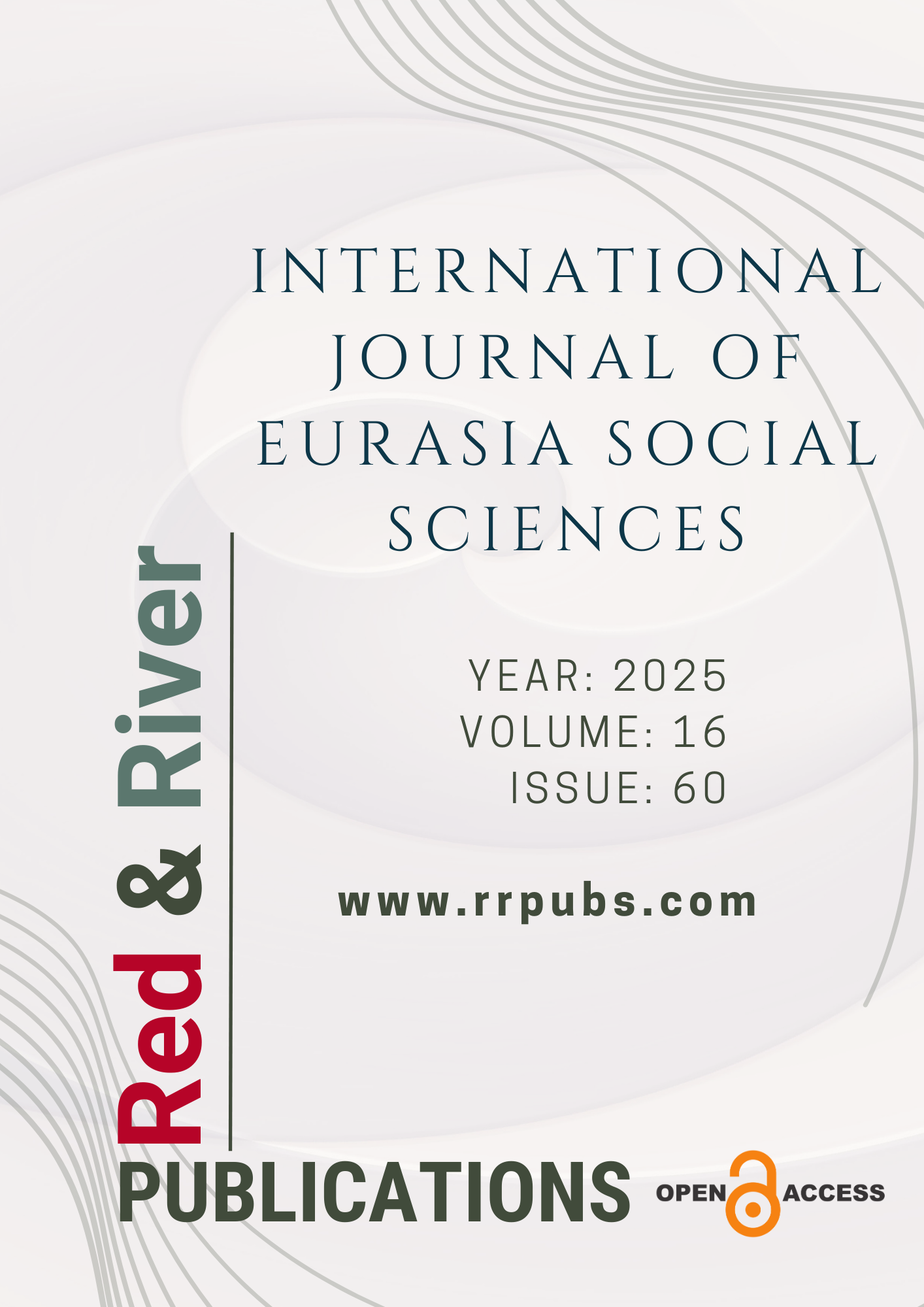Examining the sustainability competence in the common text of the Turkish century education model curriculum
DOI:
https://doi.org/10.70736/ijoess.1651Keywords:
Sustainability, curriculum, Maarif Model, sustainability development goalAbstract
The concept of sustainability can be expressed as the way societies use our common resources consciously without jeopardising the ability of future generations to meet their living needs. Sustainability has ecological, economic and social dimensions. In order for the responsibilities that these dimensions impose on individuals to permeate the society, policy makers and programmers have great responsibilities. In this context, the research aims to examine the content of the Turkey Century Maarif Model programme content, which was published in 2024 and put into practice in the 2024-2025 academic year, in terms of Sustainability Development Goals. For this purpose, document analysis method, one of the qualitative research methods, was used. The data obtained were analysed through content analysis. The common text of curricula and sustainability development goals documents were used as study documents. The titles in the joint text of the curricula: basic approaches, general objectives, student profile, conceptual skills, trends, integrated skills, virtue value action framework, literacy skills were examined in comparison with the seventeen sustainability development goals. As a result of the research, it was found that the titles in the common text of the curricula overlap with the sustainability goals. Student profile, general objectives and literacy skills titles in the curricula are the sections that contain the most content for sustainability goals. In the study, it was observed that the section with the least content was the integrated skills title. Considering the results of the study, clearer statements can be used in learning outcomes for sustainability goals in curricula.
References
Anor, C. E. (2024). Teaching sustainability in science education: Pre-service science teachers’ perceptions of the role of indigenous knowledge. African Journal of Research in Mathematics, Science and Technology Education, 28(3), 373-388. https://doi.org/10.1080/18117295.2024.2402143b
Ayvaz, A., & Ergun, M., (2025, 20-22 January). Analysis of the sustainable living and recycling unit in the Maarif Model from the perspective of the theory of didactic transposition. 12th International New York Congress of Academic Studies in Social, Human, Administrative and Educational Sciences (pp.661-676). New York, United States of America
Başgelen Akkaş, L. (2019). Sürdürülebilir kalkınma konusunda yapılan eğitim araştırmalarına yönelik doküman analizi [Yayımlanmamış yüksek Lisans tezi]. Kastamonu Üniversitesi.
Bulut, B. & Çakmak, Z. (2018). Sürdürülebilir kalkınma eğitimi ve öğretim programlarına yansımaları. Uluslararası Türkçe Edebiyat Kültür Eğitim Dergisi, 7(4), 2680-2697. https://dergipark.org.tr/tr/pub/teke/issue/42447/511230#article_cite
Cebrián, G., Junyent, M. & Mulà, I. (2021). Sürdürülebilir kalkınma için eğitimde yeterliliklere doğru güncel uygulamalar ve gelecekteki yollar. Sürdürülebilirlik, 13 (16), 8733. https://doi.org/10.3390/su13168733
Cebrián, G., Mulà, I. & Junyent, M. (2020). Sürdürülebilir kalkınma için eğitimde yeterlilikler: Ortaya çıkan öğretim ve araştırma gelişmeleri. Sürdürülebilirlik, 12 (2), 579. https://doi.org/10.3390/su12020579
Cutting, R., & Summers, D. (2016). Introducing education for sustainable development. R. Cutting ve D. Summers (Eds.). Education for sustainable development in further education: Embedding sustainability into teaching, learning and the curriculum içinde (s. 1-9). Palgrave Macmillan Published.
Duyul, S., Duyul, Y., Kesman, M., & Kesman, M. (2025). Türkiye Yüzyılı Maarif Modeli Konusunda Öğretmen Görüşleri. Ulusal Eğitim Dergisi, 5(3), 20262-20262. https://uleder.com/index.php/uleder/article/view/562
Erkol, M. (2019). Farklı öğretim etkinlikleri ile desteklenmiş öğrenme ortamının sürdürülebilir kalkınma konusuna etkisinin incelenmesi [Yayımlanmamış yüksek lisans tezi]. Van Yüzüncü Yıl Üniversitesi.
Giangrande, N., Saloff Coste, M., Clarke, T., Penha-Lopes, G., Jackson, R., East, M., … et al. (2019). Sürdürülebilir kalkınma için eğitimi değerlendirmek ve etkinleştirmek için bir yeterlilik çerçevesi: bm sürdürülebilir kalkınma hedefleri 4.7 zorluğunu ele alma. Sürdürülebilirlik, 11 (10), 2832. https://doi.org/10.3390/su11102832
Gill, J. C., & Smith, M. (2021). Introduction: Geoscience for sustainable futures. In J. C. Gill & M. Smith (Eds.), Geosciences and the sustainable development goals (pp. xiii–xxi). Springer.
Johan, K. & Turan, FM (2016). Proje Yönetiminde Sürdürülebilirlik için GPM P5 Standardını kullanan endüstriyel eğitim yaklaşımı: 21. yüzyılda sürdürülebilirlik yeterlilikleri için bir çerçeve. IOP Konferans Serisi: Malzeme Bilimi ve Mühendisliği, 160 (1), 012075. https://doi.org/10.1088/1757-899x/160/1/012075
Krippendorff, K. (2019). Content analysis: An Introduction to its methodology. (4th. ed.). SAGE Publications, Inc.
MacPherson, S. (2011). Education and sustainability: Learning across the diaspora, indigenous, and minority divide. (1th. ed.). Routledge.
Miles, M. B., & Huberman, A. M. (1994). Qualitative data analysis. An expanded sourcebook. London. Sage
Orr, D. W. (2004). Earth in mind: On Education, environment, and the human prospect. (2th.ed.). Island Press.
Özerdinç, F., Kızılay, E., & Hamalosmanoğlu, M. (2022). Eğitimde sürdürülebilir kalkınma ile ilgili yapılan çalışmaların analizi: Bir meta-sentez çalışması. Aksaray Üniversitesi Sosyal Bilimler Enstitüsü Dergisi, 6(1), 33–51. https://doi.org/10.38122/ased.976188
Soysal, H., & Akbulut, S. (2024). 2024 Türkiye Yüzyılı Maarif Modeli Kapsamında Hazırlanan 5. Sınıf Türkçe ve Sosyal Bilgiler Ders Kitaplarında sürdürülebilir kalkınma amaçlarının görünümü. Journal of Emerging Educational Studies, 1(1), 33-46. https://doi.org/10.5281/zenodo.14563283
Tecimer Altınel, Z., Hamalosmanoğlu, M., & Kızılay, E. (2024). Sürdürülebilir kalkınma için eğitim uygulamalarının öğrenciler üzerindeki etkisinin incelenmesi: Sistematik bir inceleme çalışması. Necmettin Erbakan Üniversitesi Ereğli Eğitim Fakültesi Dergisi, 6(1), 1-24. https://dergipark.org.tr/en/pub/neueefd/issue/85157/1334064
Temur, S. (2025). Türkiye Yüzyılı Maarif Modeli Öğretim Programları ortak metninin kapsayıcı ölçme ve değerlendirme ilkeleri açısından incelenmesi. Eğitim ve Bilim, 50. http://dx.doi.org/10.15390/EB.2025.13988
Tosun, A., & Gökçe, N. (2024). 2018 ve 2024 Sosyal bilgiler dersi öğretim programlarının sürdürülebilir kalkınma amaçları açısından incelenmesi. The Journal of International Educational Sciences, 11(40), 249-283. http://dx.doi.org/10.29228/INESJOURNAL.78214
Ülçay, O. (2024). Türkiye yüzyılı maarif modeli değerlendirmesi. Ulusal Eğitim Toplum ve Dünya Dergisi, 1(2), 70-75. https://doi.org/10.5281/zenodo.11097248
Yıldırım, G. (2020). Sürdürülebilirlik konusundaki eğitim araştırmalarının tematik olarak incelenmesi. Mediterranean Journal of Educational Research, 14(33), 70–106. https://doi.org/10.29329/mjer.2020.272.4
Yıldırım, Y., & Çalışkan, A. (2024). Türkiye Yüzyılı Maarif Modeli’nin 21. yüzyıl insan profili açısından değerlendirilmesi. Elektronik Eğitim Bilimleri Dergisi, 13(26), 204-220. https://doi.org/10.55605/ejedus.1548121
Yıldırım, A., & Şimşek, H. (2016). Sosyal bilimlerde nitel araştırma yöntemleri (10. Baskı). Seçkin Yayıncılık.
Downloads
Published
How to Cite
Issue
Section
License
Copyright (c) 2025 Güven Kemerkaya- Solmaz Damla Gedik Altun- Ali Meydan

This work is licensed under a Creative Commons Attribution 4.0 International License.

